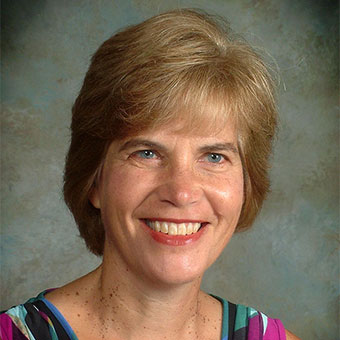
Dr. Joanne Stewart of the Hope College chemistry faculty recently presented a paper at an international professional conference regarding how an online community for chemistry educators is enriching teaching and learning.
She presented “Distributed leadership in a distributed community of practice: Enabling professional development through trust, support and fun” during the annual meeting of the International Society for the Scholarship of Teaching and Learning (ISSOTL), held on Tuesday-Friday, Oct. 27-30, in Melbourne, Australia, at RMIT University. The paper featured the results of research by Stewart and two Hope students on the impact of the Interactive Online Network of Inorganic Chemists (IONiC) on faculty teaching and leadership development.
IONiC is an international initiative through which chemistry educators share classroom and laboratory lessons and ideas to both inform and excite undergraduate students about the discipline. Launched by a team of seven chemists, IONiC now has more than 800 registered users. Through IONiC’s web site, “VIPEr” (for “Virtual Inorganic Pedagogical Electronic Resource”), the project currently makes available—at no cost—more than 700 lessons in a variety of subfields within inorganic chemistry.
A professor of chemistry at Hope, Stewart has been a member of IONiC’s leadership council since 2007. She conducted the research about IONiC collaboratively with Hope juniors Matthew Commet, a biology major from Flushing, and Anna Dowd, a chemistry major from Elk Grove Village, Illinois.
The study, based on a survey, interviews and an analysis of participation rates, has found that faculty participants feel supported by the community and change both their teaching content and methods after participating. Participants in turn wish to give back to the community, including by providing lessons, materials and ideas which then help others.
IONiC’s development was supported by a two-year, $150,000 grant received from the National Science Foundation (NSF) in 2007. IONiC is currently in the fourth year of a four-year, $437,962 award from the NSF that is supporting the development of additional classroom and laboratory lessons.
More information about IONiC is available at www.ionicviper.org.
Stewart has been active at the national level for more than two decades in efforts to enhance science education. She has held or administered multiple grants, from agencies and organizations including the NSF and Howard Hughes Medical Institute (HHMI), for projects focused on science education nationally as well as on the Hope campus. Through the years, she has made presentations on interdisciplinary learning and communities of practice at off-campus workshops sponsored by the Mellon Foundation, the NSF and the Howard Hughes Medical Institute, among others. She co-edited the 2013 book “Connected Science,” focused on making college science education more effective and engaging.
She was a 2005-06 Carnegie Scholar in the Carnegie Academy for the Scholarship of Teaching and Learning (CASTL), which engaged 21 college and university faculty in projects that explored the integration of learning across courses, over time, and between campus and community life. In 2012 she was named a Teagle Pedagogy Fellow in the “Lattice for Pedagogical Research and Practice” program developed by the Great Lakes Colleges Association (GLCA) to enhance student learning and achievement.
Stewart has been a member of the Hope faculty since 1988, and her professional interests include chemistry research as well science teaching.
In 1996, she was one of the first two recipients of the college’s “Provost’s Award for Excellence in Teaching” (now the “Janet L. Andersen Excellence in Teaching Award”). In 2009, she was chosen to speak through the “Last Lecture Series” organized by the college’s chapter of the national Mortar Board honorary society. She has mentored 69 undergraduates in collaborative research, in both her current initiatives and in her work in synthetic inorganic chemistry.